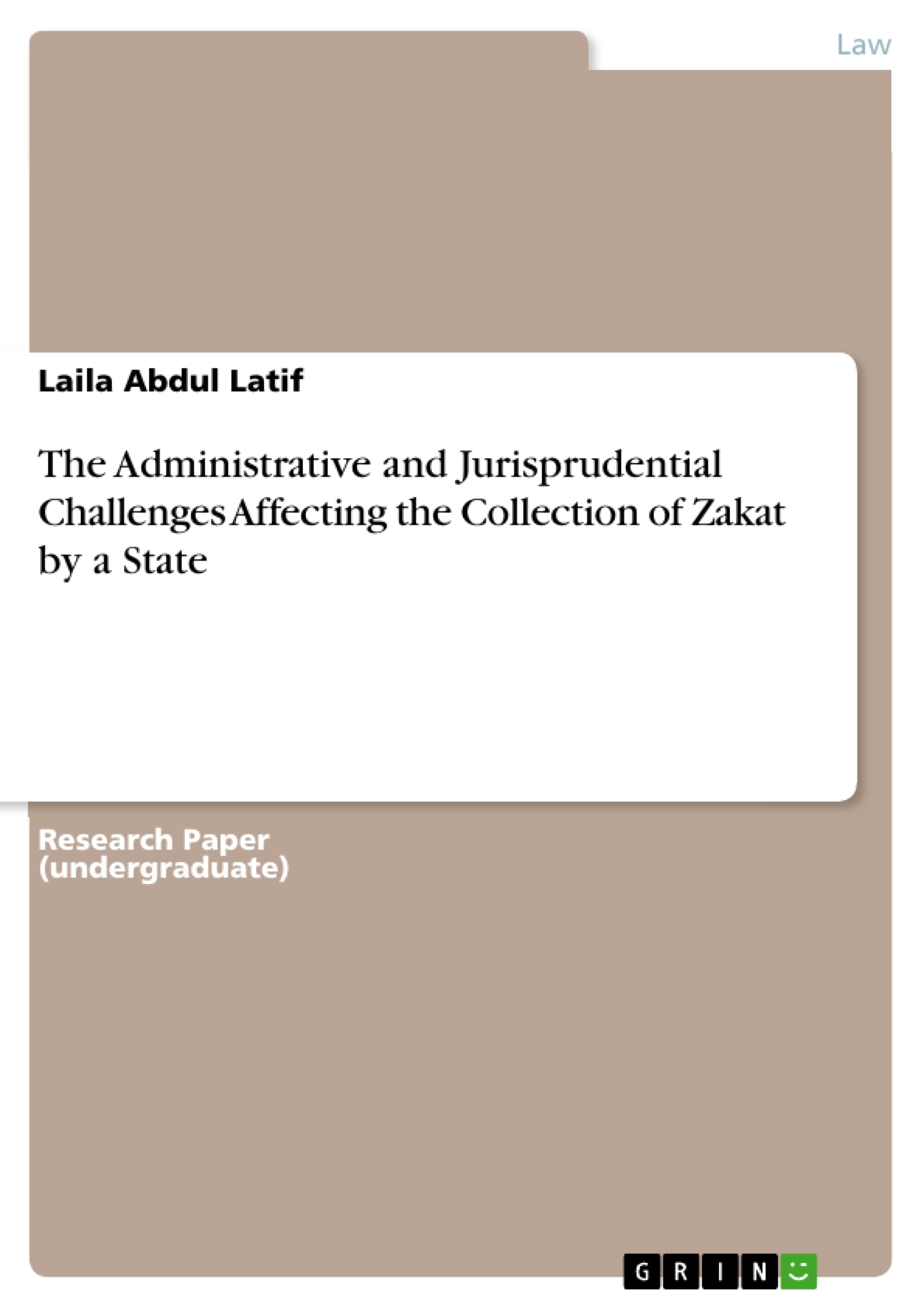State controlled zakat collection is the most effective way of collecting zakat. However, this system is not without challenges that inhibit the size of zakat revenue to be realized. These challenges are administrative and jurisprudential. A number of publicists have written several books and articles on the collection of zakat by a state. However none of them have considered the fact that this system faces challenges when it comes to the collection of zakat. This research, therefore, has attempted to add to the existing literature by identifying what these administrative and jurisprudential challenges are that affect the collection of zakat by a state. Muslim scholars have also been identified who have consistently since the time of the Prophet (peace be on him) argued for the collection of zakat by a state, but have failed to discuss that this system may be facing administrative and jurisprudential challenges that limit the revenue collected through zakat. These scholars were more concerned with the philosophies behind arguing a case for the collection of zakat by a state. Consequently, this research took upon the task of investigating through the case study approach what challenges certain selected countries faced in the collection of zakat, and whether these challenges are administrative and jurisprudential in nature and accordingly pointed out some recommendations that would aid in overcoming the identified challenges.
Inhaltsverzeichnis (Table of Contents)
- INTRODUCTION
- Background
- Statement of the Problem
- Justification of the Study
- Research Questions
- Research Methodology
- Hypothesis
- Statement of the Objective
- Theoretical Framework
- Conceptual Framework
- Limitations
- Literature Review
- THEORETICAL FRAMEWORK. ANALYSING THE JURISPRUDENCE CONCERNING THE COLLECTION OF ZAKAT BY A STATE
- Introduction
- The Theory behind the Collection of Zakat during the time of Prophet Muhammad
- The Theory behind the Collection of Zakat during the Caliphate Times
- The Theory behind the Collection of Zakat during the Post Caliphate Era
- Conclusion
- THE ADMINISTRATIVE AND JURISPRUDENTIAL CHALLENGES THAT AFFECT THE COLLECTION OF ZAKAT BY A STATE
- Introduction
- Compulsory Zakat Collection
- The Case of Sudan
- The Case of Pakistan
- The Administrative and Jurisprudential Challenges That Affect the Collection of Zakat by a State
- Conclusion
- RECOMMENDATIONS
- Introduction
- Recommendations
Zielsetzung und Themenschwerpunkte (Objectives and Key Themes)
This research investigates the administrative and jurisprudential challenges that impact the collection of zakat by a state. It explores the historical context of zakat collection, examining its evolution from the time of Prophet Muhammad to the present day. The research aims to analyze the impact of these challenges on the effectiveness of zakat as a method for poverty alleviation and equitable wealth distribution.
- The historical evolution of zakat collection
- Jurisprudential challenges related to zakat collection
- Administrative challenges impacting zakat collection
- The effectiveness of zakat as a tool for poverty alleviation and equitable wealth distribution
- Recommendations to overcome challenges and improve zakat collection
Zusammenfassung der Kapitel (Chapter Summaries)
Chapter 1 introduces the concept of zakat and its significance as the third pillar of Islam. It outlines the research problem, focusing on the challenges faced by states in collecting zakat. The chapter explains the study's objectives, research methodology, and theoretical framework, relying on the Islamic school of thought.
Chapter 2 delves into the historical and theoretical basis of zakat collection, exploring its evolution from the time of Prophet Muhammad through the caliphate eras. It examines the arguments of various Islamic scholars who support state-controlled zakat collection. The chapter concludes by highlighting the gap in existing literature regarding the challenges faced by states in collecting zakat.
Chapter 3 analyzes the administrative and jurisprudential challenges that impact state-controlled zakat collection. Using case studies of Sudan and Pakistan, it examines the effectiveness of compulsory zakat collection systems. The chapter identifies various challenges, including differing interpretations of zakat regulations across different schools of thought, administrative inefficiencies, and issues related to zakat assessment, collection, and disbursement.
Chapter 4 provides recommendations to address the challenges identified in Chapter 3. The chapter suggests strategies such as harmonizing interpretations of zakat regulations across different schools of thought, educating the public about zakat and training government officials in its collection, implementing efficient zakat administration systems, promoting accountability and transparency, and offering tax incentives to zakat payers.
Schlüsselwörter (Keywords)
This research focuses on the administrative and jurisprudential challenges affecting the collection of zakat by a state. Key terms and concepts include zakat, Islamic law, Islamic jurisprudence (fiqh), poverty alleviation, equitable wealth distribution, state-controlled zakat collection, administrative challenges, jurisprudential challenges, and recommendations.
Frequently Asked Questions
What is the research focus regarding Zakat collection?
The research investigates the administrative and jurisprudential challenges that states face when implementing compulsory Zakat collection systems, and how these challenges affect revenue.
Why is state-controlled Zakat collection considered effective?
State-controlled collection is theorized as the most efficient way to ensure equitable wealth distribution and poverty alleviation, following the historical model established during the time of Prophet Muhammad and the Caliphates.
Which countries were used as case studies in this research?
The study focuses on the compulsory Zakat collection systems of Sudan and Pakistan to identify practical challenges and administrative inefficiencies.
What are jurisprudential challenges in Zakat collection?
Jurisprudential challenges involve differing interpretations of Zakat regulations among different Islamic schools of thought (fiqh), which can lead to inconsistencies in how Zakat is assessed and collected.
What recommendations does the study offer to improve Zakat collection?
Key recommendations include harmonizing legal interpretations, training government officials, implementing transparent administration systems, and providing tax incentives for Zakat payers.
- Arbeit zitieren
- Laila Abdul Latif (Autor:in), 2012, The Administrative and Jurisprudential Challenges Affecting the Collection of Zakat by a State, München, GRIN Verlag, https://www.grin.com/document/305929



